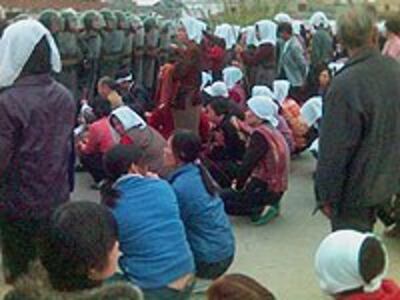
HONG KONG—More armed police have moved into Dongzhou village near the southern Chinese port of Shanwei, eight days after residents seized eight officials to demand the release of a local activist.
Villagers told RFA’s Mandarin and Cantonese services that the village was largely shuttered with up to 1,000 armed police on guard. Schools, shops, and offices were mostly closed, they said, describing the area as extremely tense.
Less than a year ago in the same village, paramilitary forces shot and killed at least three people protesting what they said was inadequate compensation for land used to build a power station.
Many residents declined to be interviewed by telephone on Friday, and Internet connections remained cut off. “All Internet connection is dead. We cannot get online from home. It started yesterday,” a male villager said on condition of anonymity.
No backing down
On Friday, one villager told RFA’s Mandarin service, “around 3:00 p.m., they [some officials and police] entered the village. They were armed. They arrived at Houpu, a residential area in the heart of the village. And they were surrounded by a lot of villagers. We believe the police had intended to detain more people. But when they found themselves surrounded by villagers, they withdrew.”
Another villager, also speaking condition of anonymity, said Houpu is where the eight officials are being held.
We promise not to hurt the hostages and will treat them well. If they release Chen, we will free the officials.
“Houpu is in the heart of the village where there are many narrow alleyways. So the officials and police were afraid to move in,” he said.
RFA-Mandarin reporter Ding Xiao received a text message saying police had released some kind of gas after entering the village, possibly a smoke bomb.
The standoff began Nov. 9, when Dongzhou police detained villager Chen Qian, described by neighbors as in his fifties and as hanging anti-corruption banners in the village when he was taken into custody.
Hundreds of villagers went to the neighborhood committee the following day to demand his release and took eight village cadres hostage when they refused, villagers said.
Local authorities have indicated that Chen Qian was to be indicted, but the charges against him are unknown.
A local woman involved in negotiating an end to the standoff said villagers were looking after the detained officials but sticking by their demands.
“They haven’t released [Chen],” she told RFA’s Cantonese service. “We promise not to hurt the hostages and will treat them well. If they release Chen, we will free the officials.”
We are fearful that it will end in a worse way than the incident last year. There are public security and armed police. We are all hiding in our houses.
“But the authorities told the officials held hostage that they needn’t be scared. If anything happens to them, the villagers will bear all the responsibility,” the woman said, noting that the hostages were in contact by phone with other officials.
Villagers told RFA’s Mandarin service they had learned that police intended to detain two more activists, including a man named A Cai who “would play the gong to alert the villagers of things.”
Another villager, a man, said that the other person the police were trying to detain was a man who had gotten into a scuffle with a local official who had assaulted his wife.
A police officer contacted by telephone said only, “I know nothing,” before hanging up.
Bloody history
One villager, surnamed Lin, said local residents feared worse bloodshed than on Dec. 6, 2005.
In that incident, according to China’s official Xinhua news agency, police opened fire “in alarm” on protesters who attacked them with home-made explosives, killing at least three people.
But the villagers said police fired first on an unarmed crowd, and that the death toll was higher than official reports admitted
“We are fearful that it will end in a worse way than the incident last year. There are public security and armed police. We are all hiding in our houses,” Lin said.
Dongzhou appears to be experiencing one of the thousands of protests and confrontations that the Chinese government says happen every year despite efforts to address widespread corruption allegations and growing disparities in wealth.
According to an official report, the number of protests and riots in China fell by more than one-fifth in the first nine months of 2006, down 22.1 percent from a year earlier. Many protests are related to land seizures, pollution, and corruption.
Original reporting in Mandarin by Ding Xiao and in Cantonese by Lee Kin-kwan. RFA Mandarin service director: Jennifer Chou. RFA Cantonese service director: Shiny Li. Translated and edited by Luisetta Mudie. Written in English by Sarah Jackson-Han.
